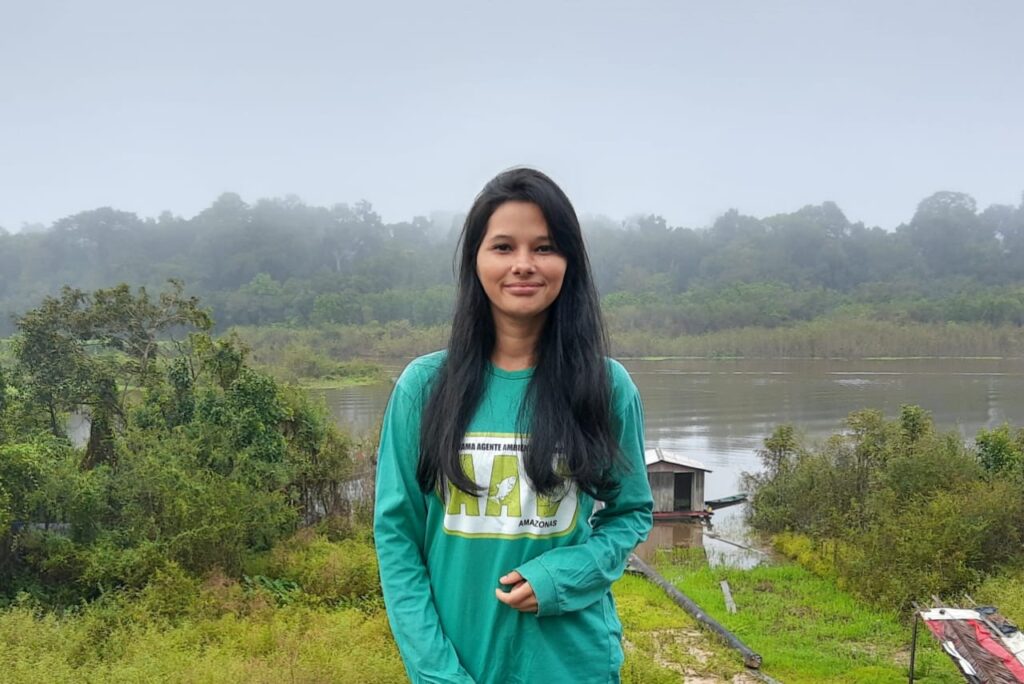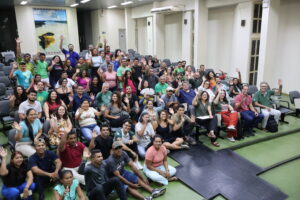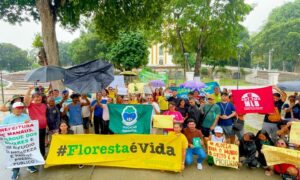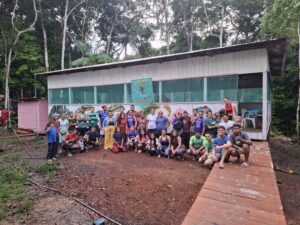By Maria Cunha
The Agente Ambiental Voluntário program (Voluntary Environmental Agent – AAV) works on developing collective attitudes to raise public awareness and respect for the environment. It is a creative experience that encourages people to learn, be and do, through the exchange of everyday experiences. The main focus of the program is to help the Voluntary Environmental Agents develop as environmental educators, to pass on information about how to use natural resources sustainably, to inform the public about current legislation and to carry out protection and surveillance actions, through environmental efforts.
In the mid-Juruá, voluntary work is part of the diverse strands of commitment, wisdom and creativity that this region cultivates, and the voluntary environmental agents are people from rural communities, with a spirit of leadership, positive attitudes and who like to work in defense of the environment. In almost all communities of the mid-Juruá, there is more than one agent, qualified to work in their communities and the surrounding area, who contribute substantially towards the management of conservation units, as well as to community organization and the strengthening of leadership in these communities. Taking care of the environment is everyone’s task, and it is with this focus that the environmental agents of the mid-Juruá work, proposing environmental education activities to the communities that make people more aware of the need to take care of nature. Natural resources are depended upon by traditional people, and this connection to the forest is a culture cultivated by all who live here. Protecting these resources with a view to the future of the community and the world is a practice that is becoming more and more common in our region, as the idea becomes increasingly accepted that taking care of nature is taking care of life, both for the planet and for ourselves.
And with this focus on ‘caring for the environment’, AAVs have acted frequently in their communities and conservation units. As environmental educators, it is necessary to work on skills, creativity, respect, and awareness in order to guarantee success in the field, so that agents can: talk about environmental issues and seek to carry out continuous environmental education work; carry out practices to achieve the sustainability of communities and neighboring areas; identify actions that harm the environment and mediate environmental conflicts; make each resident a catalyst for sustainable practices; give talks on environmental education in schools; organize and carry out, together with residents, community clean-up efforts; guide communities to preserve natural resources in protected areas; participate in community meetings and other events of interest and pass on any information acquired elsewhere to their home community to keep them updated; and hold frequent meetings with community leaders in order to plan sustainable actions. These are just some of the important actions that AAVs perform in the region, in their communities and conservation units. The work of the AAV, with the support of management bodies, partner institutions, leaders, among others, becomes increasingly important to build together a more sustainable present and future for our mid-Juruá. And, why not, for our Amazon and Brazil?
The mid-Juruá is a fertile land, every seed that is planted here, grows, is watered with great effort and dedication by all our people who inhabit our forests – a people who believe in the new, who get involved and make the desired changes happen for a better life quality. This work of the Voluntary Environmental Agents is a way of working with the future “guardians of the Amazon”. That is why this awareness about caring for the environment is so important – so that a generation that can be prepared to fight to maintain the standing forest. This is how we proceed today, in the present, making small actions that will contribute to the arrival of a future increasingly rich in quality of life. Living in the forest is about having a quality of life that only nature can transmit. AAVs are part of these ‘guardians’ and our hope for the future is that communities, once they are aware, will increasingly work in harmony with nature, and that the sustainability of our region will become an increasingly productive path and rich in quality of life for the traditional peoples who live here. Because we believe that if the human being is capable of destroying, he is also able to discover how to use the land, reducing negative impacts and helping to preserve nature. We, as environmental agents, believe that taking care of the Amazon means working for the people who live here, people who are directly connected to the natural resources that nature provides. We already do a lot, but much environmental education is still lacking so that the Amazon can be ‘delivered into good hands’.
As a message to you who read this text, I leave a reflection: what kind of people are we preparing to take care of our Amazon? You can also be a ‘guardian of the forest’ and make people aware of the benefits for the forest and our lives. Every small action is important if it is designed to conserve our natural resources. Taking care of the forest is a task that must be cultivated with great care by each one of us. The biodiversity of the mid-Juruá is our certainty that we are taking care of life and cultivating it. Being a voluntary environmental agent is, collectively, helping to lead a history of preservation for a better future.

Maria Cunha lives at São Raimundo community, in the Médio Juruá Extractive Reserve. She is 27 years old, a sustainable production technician in conservation units, a voluntary environmental agent and a reading mentor for Associação Vagalume.






